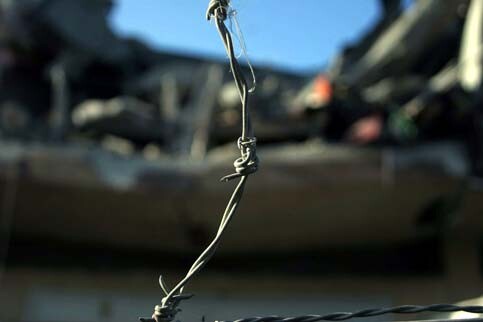17 November 2006

Barbed wire hangs in front of the remains of the house of Issam Madhi, a member of the Fatah-affiliated Abu Ar-Rish Brigades, after it was hit in an Israeli air strike in the Rafah refugee camp in the southern Gaza Strip November 16, 2006. The Israeli air force struck 5 different buildings around the Gaza Strip during the night. (MaanImages/Hatem Omar)
Gaza humanitarian crisis - a joint statement by Israel’s leading human rights organizations
Nine Israeli human rights organizations issued an unprecedented joint call to the international community to ensure human rights in the Gaza Strip. The statement comes in light of the dire humanitarian situation there:
Some 80% of the population is extremely poor, living on less than $2 a day. A majority of the population is dependant on food aid from international donors.
In the past four months, the Israeli military has killed over 300 Palestinians in the Gaza Strip. Over half of those killed were unarmed civilians who did not participate in the fighting. Among the dead, 61 were children.
About 70% of Gaza’s potential workforce is out of work or without pay.
On 28 June, Israel bombed Gaza’s only independent power station, which produced 43% of the electricity needed by the residents in Gaza. Since then, most of the population has electricity between 6 and 8 hours each day, with disastrous consequences on water supply, sewage treatment, food storage, hospital functioning and public health.
The Gaza Strip is almost entirely sealed off from the outside world, with virtually no way for Palestinians to get in or out. Exports have been reduced to a trickle; imports are limited to essential humanitarian supplies.
Israel cannot shirk its responsibility for this growing crisis. Even after its Disengagement in 2005, Israel continues to hold decisive control over central elements of Palestinian life in the Gaza Strip:
Israel continues to maintain complete control over the air space and territorial waters.
Israel continues to control the joint Gaza Strip-West Bank population registry, preventing relocation between the West Bank and Gaza, and family unification.
Israel controls all movement in and out of Gaza, with exclusive control over all crossing points between Gaza and Israel, and the ability to shut down the Rafah crossing to Egypt.
Israeli ground troops conduct frequent military operations inside Gaza .
Israel continues to exercise almost complete control over imports and exports from the Gaza Strip.
Israel controls most elements of the taxation system of the Gaza Strip, and since February has withheld tax monies legally owed to the PA, and amounting to half of the to tal PA budget.
The broad scope of Israeli control in the Gaza Strip creates a strong case for the claim that Israel’s occupation of the Gaza Strip continues, along with an obligation to ensure the welfare of the civilian population. Regardless of the legal definition of the Gaza Strip, Israel bears legal obligations regarding those spheres that it continues to control. Israel has the right to defend itself. However, all military measures taken by Israel must respect the provisions of international humanitarian law.
The following Israeli human rights organizations call on the international community to ensure that Israel respects the basic human rights of residents of the Gaza Strip, and that all parties respect international humanitarian law:
B’Tselem: the Israeli Information Center for Human Rights in the Occupied Territories
Association for Civil Rights in the Israel
Amnesty International - Israel Section
Bimkom: Planners for Planning Rights
HaMoked: Center for the Defense of the Individual
Gisha: Center for the Legal Protection of Freedom of Movement
Physicians for Human Rights-Israel
Public Committee Against Torture in Israel
Rabbis for Human Rights
Related Links